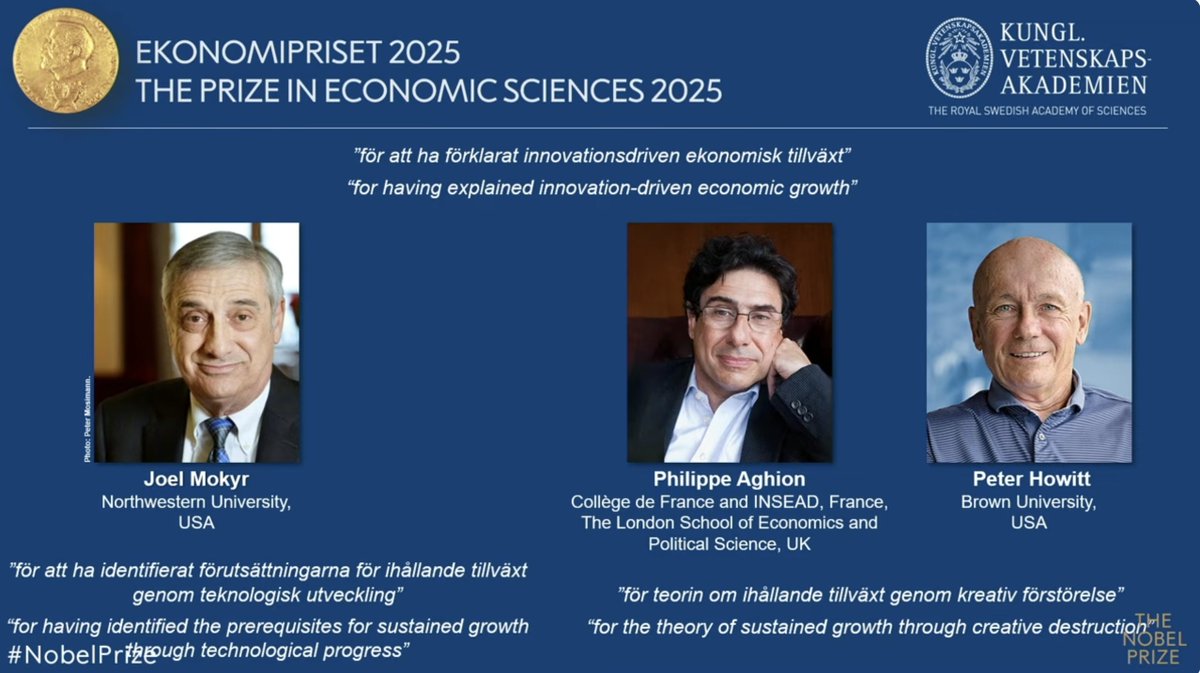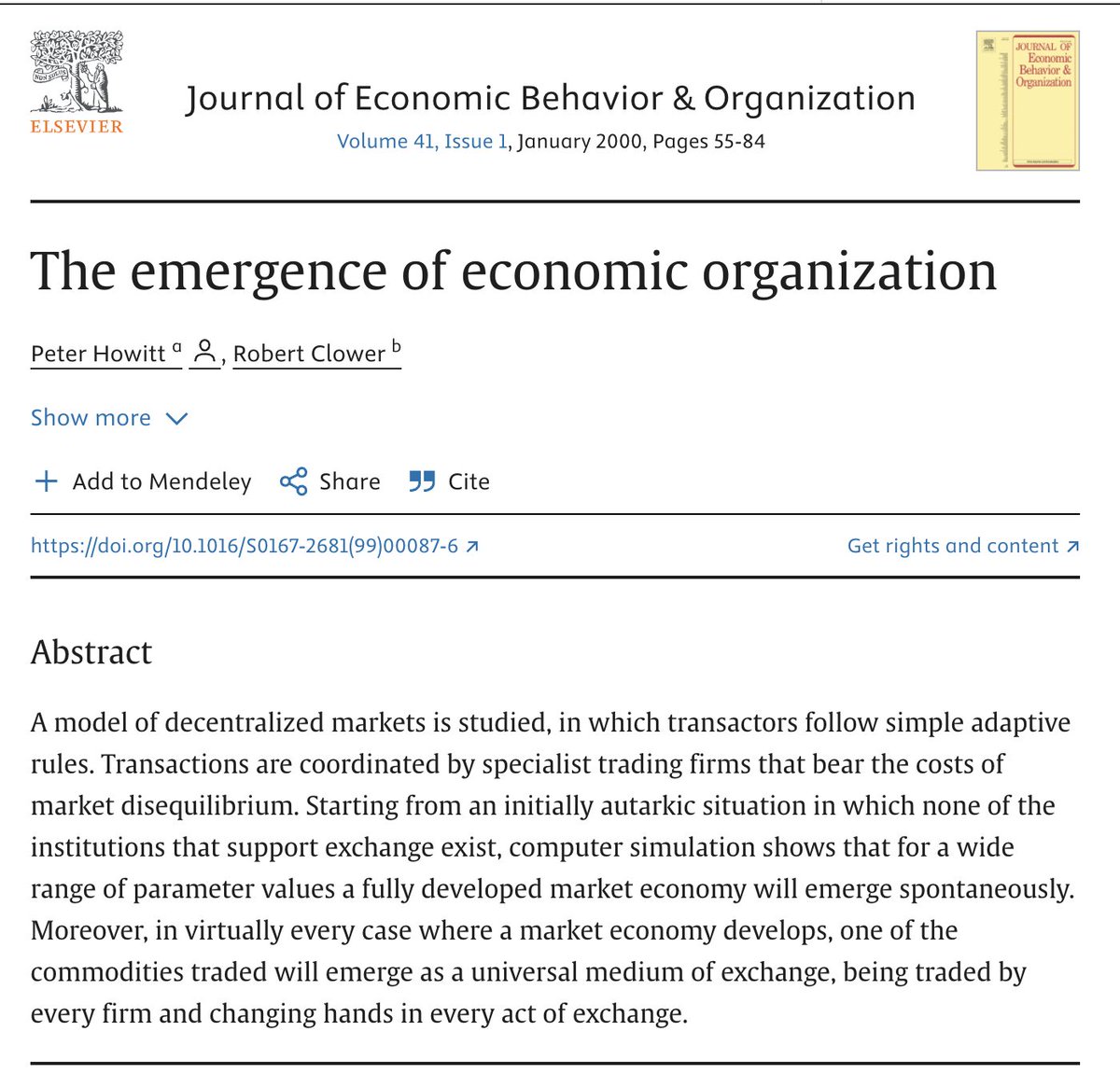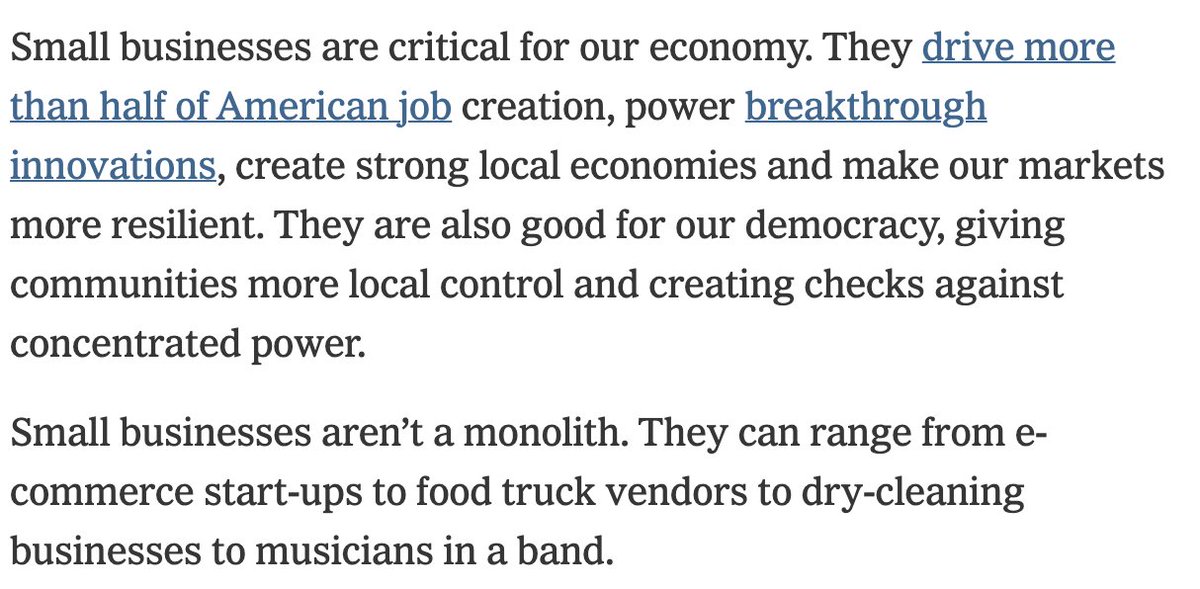🚨 2025 Nobel Prize in Economics goes to Mokyr, Aghion and Howitt 🚨
"for having explained innovation-driven economic growht"
The best prize in years!
"for having explained innovation-driven economic growht"
The best prize in years!

For most of human history, living standards barely changed. Then something shifted.
This is THE question. The hockey stick. Why did it happen? What happened?
Modern economics get critiqued for being meaursable stuff that doesn't matter. Not these guys
This is THE question. The hockey stick. Why did it happen? What happened?
Modern economics get critiqued for being meaursable stuff that doesn't matter. Not these guys
Mokyr gets half for explaining the prerequisites. This is the first history prize in decades and no deserved.
Aghion & Howitt share half for modeling the mechanism.
Let me break down what they did.
Aghion & Howitt share half for modeling the mechanism.
Let me break down what they did.
The hockey stick. Why do we get it?
In particular, why did we first get it in the industrial revolution?

In particular, why did we first get it in the industrial revolution?


Mokyr's insight: You need two types of knowledge working together.
Prescriptive knowledge: How to DO something (recipes, instructions, techniques)
Propositional knowledge: WHY it works (scientific understanding of underlying principles)
Prescriptive knowledge: How to DO something (recipes, instructions, techniques)
Propositional knowledge: WHY it works (scientific understanding of underlying principles)
The Industrial Revolution happens when those two start feeding each other.
The Nobel's figure is giving me doughnut economic vibes so don't love that but....
The Nobel's figure is giving me doughnut economic vibes so don't love that but....

A lot has happened on this question since 1992 but Mokyr's first book is still worth reading.
amzn.to/3ILdfEm
amzn.to/3ILdfEm

There are just so many great Mokyr papers and books. I don't know what to start with.
This paper has the most clear title. "The Intellectual Origins".
That's the game. That's what matters for economic growth.
cambridge.org/core/journals/…
This paper has the most clear title. "The Intellectual Origins".
That's the game. That's what matters for economic growth.
cambridge.org/core/journals/…

We entered Republic of Letters: an early‑modern, pan‑European market for ideas with low entry barriers, peer criticism, and prizes/journals.
Competition + openness helped progress survive politics.
Competition + openness helped progress survive politics.
It's not just the academic stuff.
Mokyr emphasizes you also need:
- Skilled artisans and engineers who can turn ideas into commercial products
- A society open to change
That last point is huge. New technology creates winners AND losers.
Mokyr emphasizes you also need:
- Skilled artisans and engineers who can turn ideas into commercial products
- A society open to change
That last point is huge. New technology creates winners AND losers.
"The liberal ideas of religious tolerance, free entry into the market for ideas, and belief in the transnational character of the intellectual community were essential to Enlightenment"
That's what I see as the core of his ideas. There are so many though
amzn.to/3J9RMVA
That's what I see as the core of his ideas. There are so many though
amzn.to/3J9RMVA

I'll have more to say on Mokyr in a newsletter today, so make sure you subscribe.
Now onto Aghion and Howitt economicforces.xyz
Now onto Aghion and Howitt economicforces.xyz
God I love this prize. Mokyr is my heart, he's the person I read at night for fun. But I'm not an economic historian.
I'm a theorist of competition and dynamism. Aghion-Howitt is what I work on day to day
I'm a theorist of competition and dynamism. Aghion-Howitt is what I work on day to day
I give this talk regularly where I give two facts.
1. Economic growth in places like the US is crazy consistent
If I put up decade by decade growth, you can't tell which is which (besides maybe 2000s with the GFC)

1. Economic growth in places like the US is crazy consistent
If I put up decade by decade growth, you can't tell which is which (besides maybe 2000s with the GFC)


2. There's a CRAZY amount of creative destruction underneath.
Firms are constantly entering and exiting. The prize shows this figure.
We had almost 8 million jobs created in the last quarter of 2024.

Firms are constantly entering and exiting. The prize shows this figure.
We had almost 8 million jobs created in the last quarter of 2024.


How are both of these true?
Aghion–Howitt take the messy micro facts (entry/exit, business stealing) and show you can still get a smooth aggregate growth path.
The trick: a ladder of quality-improving innovations with “toppling.”
Aghion–Howitt take the messy micro facts (entry/exit, business stealing) and show you can still get a smooth aggregate growth path.
The trick: a ladder of quality-improving innovations with “toppling.”
Their most famous paper is "A Model of Growth Through Creative Destruction" jstor.org/stable/2951599…

Companies invest in R&D to develop better products or production methods. If successful, they get a patent and temporary monopoly profits.
But other companies keep innovating. Eventually someone develops something even better and climbs to the top of the ladder.
But other companies keep innovating. Eventually someone develops something even better and climbs to the top of the ladder.
A successful innovator releases a higher-quality product, steals the market, and the old leader’s profits vanish.
Consumers get better stuff; yesterday’s champion becomes yesterday’s news.
Consumers get better stuff; yesterday’s champion becomes yesterday’s news.
Individual markets jump when breakthroughs happen, but across thousands of markets the jumps average out—so the economy’s growth rate is basically:
growth ≈ (how big each step is) × (how often steps arrive).
growth ≈ (how big each step is) × (how often steps arrive).
The markup (profit) a leader can charge ties mechanically to the quality step.
That’s a microfoundation for variable markups across firms that IO folks will appreciate. It throws out markups as bad things economicforces.xyz/p/are-markups-…
That’s a microfoundation for variable markups across firms that IO folks will appreciate. It throws out markups as bad things economicforces.xyz/p/are-markups-…
You can also ask about "optimal" innovation.
Positive externalities (knowledge spillovers) mean under-investment; business-stealing can mean over-investment.
Policy can push either way depending on sector/timing.
Positive externalities (knowledge spillovers) mean under-investment; business-stealing can mean over-investment.
Policy can push either way depending on sector/timing.
We recently had another growth Nobel for Romer.
Where Romer’s ideas are often complements that lift all boats, Aghion-Howitt make new goods substitutes that replace the old.
How important is that? It allows people to fit more of the microfacts so has become the workhorse
Where Romer’s ideas are often complements that lift all boats, Aghion-Howitt make new goods substitutes that replace the old.
How important is that? It allows people to fit more of the microfacts so has become the workhorse
You get a lot more tractability of the Aghion-Howitt model and you can start asking questions like "how are concentration and innovation connected?"
A famous (highly argued) paper argues for an inverted U homepages.ucl.ac.uk/~uctp39a/ABBGH…

A famous (highly argued) paper argues for an inverted U homepages.ucl.ac.uk/~uctp39a/ABBGH…


Because this is my thread! let me say a bit more about a different paper I love. And the prize committee missed a connection to Mokyr 

With Robert Clower, he tackled an even more fundamental question: Where do markets come from?
Standard economics assumes markets just exist, coordinated by some mythical "auctioneer." But who IS this auctioneer?
Standard economics assumes markets just exist, coordinated by some mythical "auctioneer." But who IS this auctioneer?
Howitt & Clower (2000) start from autarky - no markets, no money, nothing.
They simulate people following simple rules. Entrepreneurs randomly try opening shops. Some survive, others fail. (very creative destructiony)
sciencedirect.com/science/articl…
They simulate people following simple rules. Entrepreneurs randomly try opening shops. Some survive, others fail. (very creative destructiony)
sciencedirect.com/science/articl…
What emerges? A network of specialist traders AND one commodity becomes "money."
The key insight: which commodity becomes money is path-dependent, BUT commodities that are cheaper to trade (more portable, divisible) are MORE likely to win.
The key insight: which commodity becomes money is path-dependent, BUT commodities that are cheaper to trade (more portable, divisible) are MORE likely to win.
This connects the prize perfectly:
Mokyr: growth requires knowledge + institutions open to change
Aghion-Howitt: growth operates through creative destruction
Howitt-Clower: those institutions emerge spontaneously under the right conditions
Mokyr: growth requires knowledge + institutions open to change
Aghion-Howitt: growth operates through creative destruction
Howitt-Clower: those institutions emerge spontaneously under the right conditions
Again, I'll have more to say. In the meantime, make sure you subscribe and read last year's summary economicforces.xyz/p/and-the-2024…
I’m really happy to see the announcement and @ATabarrok stress the connection to Haltiwanger’s work, especially about productivity and firm size (market share)
marginalrevolution.com/marginalrevolu…
marginalrevolution.com/marginalrevolu…

@ATabarrok I've been harping on the importance of this measure for a long time. This is how we measure how feasible creative destruction is.
Do the innovators actually win the market? In the US they do and we get growth. But that's not true everywhere economicforces.xyz/p/how-should-w…
Do the innovators actually win the market? In the US they do and we get growth. But that's not true everywhere economicforces.xyz/p/how-should-w…
@ATabarrok If you want more detail on each of the winners, here is my newsletter on the topic economicforces.xyz/p/and-the-2025…
• • •
Missing some Tweet in this thread? You can try to
force a refresh









